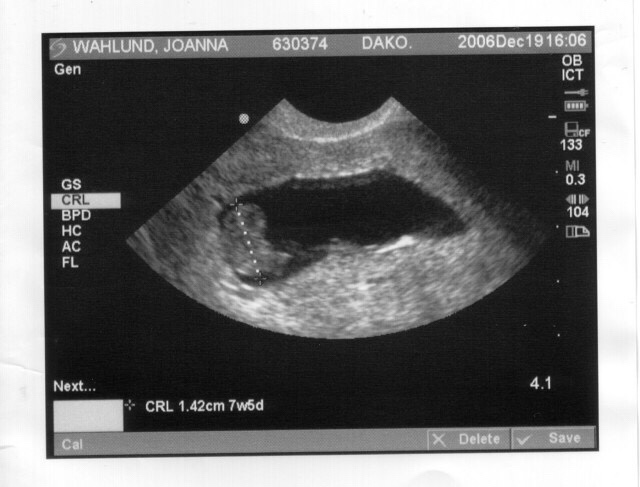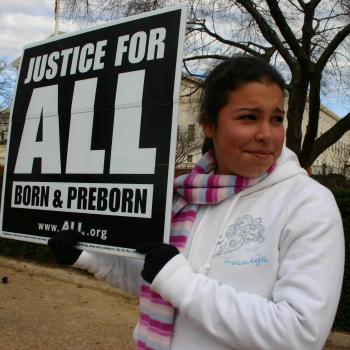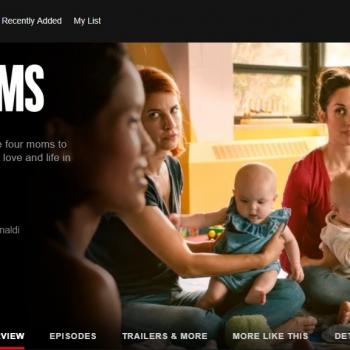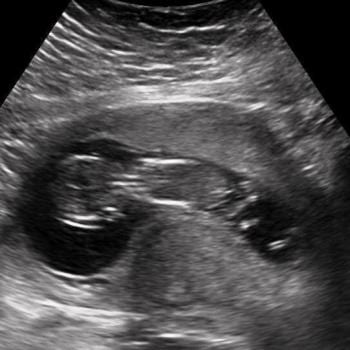
The first time I heard it, I dismissed it as madness. “There are lunatics on both ends of the spectrum,” I told myself.
Then, I saw the argument propagated again… and again… and again. In fact, I saw it a number of times on assorted sites, including my own personal blog, put forward by several different people. “Rational people can’t seriously believe this,” I thought, flabbergasted. “Not in 2018 with a plethora of scientific evidence to the contrary.”
Sadly, it seems that they can. And do. Frequently. For a while I entertained the delusion that those who believe this line of reasoning are part of some radical fringe who enjoy hanging around pro-life blogs and baffling other readers with their stunning displays of ignorance, but when I participated in abortion debates regarding the repeal of Ireland’s eight amendment and kept repeatedly encountering this belief, I could only deduce that there were people who actually thought this way.
As I have encountered this mindset more and more often, I have concluded that it has become necessary to explain this very simple concept.
Are you ready? Okay, here it is:
An abortion is not the same thing as a miscarriage.
I know, it seems glaringly obvious, doesn’t it? However, there are people who think there is no difference!
Part of the confusion may stem from the fact that the literal medical term for a miscarriage is a “spontaneous abortion.” The medical field has used the term “abortion” to refer to the expulsion of a fetus from the uterus long before the word became political. However, medical terminology also distinguishes between abortions that are due to natural causes (i.e., miscarriage) and those that are due to an action on the part of an outside force. The National Center for Biotechnology Information states: “A miscarriage may also be called a ‘spontaneous abortion.’ This refers to naturally occurring events, not medical abortions or surgical abortions” (emphasis mine).
Let’s review the terminology:
Miscarriage/spontaneous abortion – unwanted and unintended death of an unborn child caused by naturally occurring events (genetic abnormalities, defect in the woman’s reproductive organs, etc.) In most cases, the child’s already deceased body is expelled naturally by the mother’s body. In other cases, the baby’s body needs to be removed via chemical or surgical intervention.
Medical abortion, aka medication abortion, aka chemical abortion – induced or procured abortion caused by ingesting specific pharmaceuticals. These pharmaceuticals kill a healthy, living child and cause its expulsion from the uterus.
Surgical abortion – induced or procured abortion caused by undergoing surgery. The surgery kills a healthy, living child whose body is then surgically removed from his or her mother’s uterus.
Are we clear on this?
Sometimes, a child dies within its mother’s womb but the mother’s body, for often unexplainable reasons, does not naturally expel the child’s body. Often, a mother does not know her child has died until an ultrasound reveals that fact.
This was my experience, three times.
Above is the image from the ultrasound that diagnosed my first missed miscarriage. We named our child Noel.
When I went to my first prenatal appointment for my second pregnancy in December 2006, my midwife ordered an ultrasound because she couldn’t find the baby’s heartbeat via Doppler (I was 12 weeks along and the baby’s heartbeat should have been audible at that point). The ultrasound revealed that the baby had stopped developing around 8 weeks, and that s/he had no heartbeat. The official diagnosis was a “missed abortion,” although my midwife referred to it as a “missed miscarriage,” because she was a compassionate and caring human being and realized the pain it would cause me to refer to the loss of my much-wanted baby as an “abortion.”
My midwife and an OB both recommended that I have a D&C, as it’d been nearly 4 weeks since the baby’s death and nothing had happened naturally. I agreed and had the D&C a few days later. A D&C is the procedure used in most first-trimester surgical abortions.
Given this fact, I have had abortion proponents suggest that since the same surgical procedure is used to kill living babies and remove already-deceased ones, there is no difference between an abortion and a miscarriage.
In sum, these abortion proponents say that I killed my baby, even though s/he had been dead for four weeks before I even knew anything was wrong.
This “logic” is, of course, ludicrous. A scalpel can be used to perform life-saving surgery, but it can also be used to cause someone’s death. Does it then follow that all deaths that occurred while a scalpel was in use have the same moral weight, regardless if the doctor was struggling to save his patient or kill him?
The Catholic Church teaches that medical procedures such as D&Cs and D&Es are morally neutral. They have very legitimate uses, such as treating missed miscarriages and removing the body of an already-deceased child from his/her mother’s womb. They also have illegitimate uses, such as deliberately killing a healthy living child within his mother’s womb and then removing the body of that murdered child.
The end of the procedure – removal of a dead child from its mother’s womb – may be the same in both cases, but the means and intent are both very, very different. In the case of a missed miscarriage, the mother did not intend or will the death of her child. In the case of an induced abortion, the mother did intend or will the death of her child – or, at the very least, the abortionist did. (Sadly, many mothers don’t have proper informed consent and so don’t realize that what they are “consenting” to is the death of a child; others are forced or coerced into abortion.)
Here is another analogy I often use to illustrate how the ends don’t justify the means:
Mike knows that he is the sole heir of his wealthy, terminally ill grandmother, and he is looking forward to his inheritance. One night, Grandma dies peacefully in her sleep. Mike inherits and lives happily ever after.
versus
Mike knows that he is the sole heir of his wealthy, terminally ill grandmother, and he is looking forward to his inheritance. One night, he smothers his grandmother with a pillow. As Mike is the immediate next of kin, he declines an autopsy and no one is the wiser as to how Grandma really met her end. Mike inherits and lives happily ever after.
In Catholic circles, Mike’s killing of his grandmother is murder, despite the fact that she was about to die anyway. While the ends are the same in the two scenarios (Grandma dies and Mike inherits), the intent and means are very, very different.
In “Pro-Abortion Fantasy Land,” however, there is absolutely no difference in the two scenarios. In their view, Grandma’s death was identical in each scenario since the ends were the same. Also, since God kills people via natural causes all the time so it was perfectly okay for Mike to kill too (in fact, taking that logic to its natural conclusion, all murder is therefore justified because people die of natural causes every day).
The secular site Very Well Family admits, “The elective ending of a pregnancy is a completely different situation than the loss of a wanted pregnancy, both medically and emotionally.” Why is this concept so hard to grasp for abortion rights advocates?












